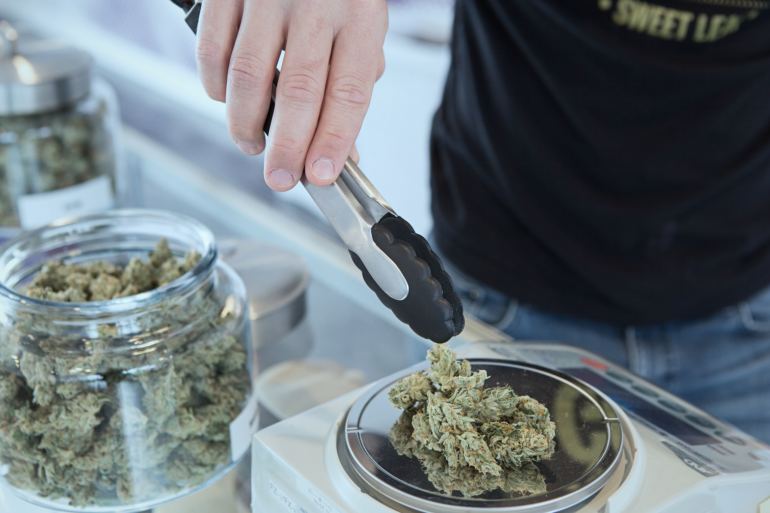Legal Update
Apr 2, 2021
New York Passes Recreational Cannabis Law
New Law Calls into Question Whether Employers Can Take Actions Against Employees Who Smoke Pot Immediately Before Their Work Shift
By: Jennifer L. Mora, Adam R. Young, Robert T. Szyba, and Daniel R. Birnbaum
Seyfarth Synopsis: New York has become the latest state to enact a law protecting the use of personal nonmedical cannabis for individuals age 21 and over. As one of the nation’s largest cannabis markets, New York will eliminate the criminalization of possession of less than three ounces of cannabis and significantly expand the list of medical conditions that qualify for medical cannabis use under the state’s current law. While the new law is not immediately in effect, New York employers should proceed to review their current policies and drug testing practices to ensure compliance with New York’s law.
On March 30, 2021, New York’s legislature approved “The Marijuana Regulation and Taxation Act,” a bill legalizing the sale and use of cannabis for adults 21 and older, which was subsequently signed into law by Governor Andrew M. Cuomo. New York’s actions come about one month after its neighbor, New Jersey, passed a similar law decriminalizing cannabis use. Under the law, New Yorkers may possess up to three ounces of cannabis for recreational use. Cannabis use will be allowed in public wherever smoking tobacco is legal, but, as discussed below, will not be permitted in workplaces or inside a car. The new law has not changed the requirement that citizens cannot drive under the influence of cannabis.
The new law also is intended to broaden the scope of New York’s existing medical cannabis program, by expanding the list of medical conditions covered. Additionally, the existing cap of the amount of cannabis to which patients will have access will be increased from a 30-day supply to a 60-day supply.
New York’s law will impact workplaces in numerous ways:
1. Employers may still prohibit cannabis and impairment in the workplace.
The law explains that none of its requirements is intended to limit the authority of any employer to enact and enforce policies regarding cannabis in the workplace, meaning employers can still maintain drug- and alcohol-free workplaces. Employers are not required to accommodate the use, possession, sale, or transfer of cannabis in the workplace and may prohibit employees from being impaired during work hours.
2. New Prohibitions on Employment Discrimination Based on Cannabis Use Outside of Work.
The law prohibits employers from refusing to hire, employ or license, or to discharge from employment or otherwise discriminate against an individual in compensation, promotion or terms, conditions or privileges of employment because of an individual’s legal use of consumable products, including cannabis in accordance with state law, or an individual’s legal recreational activities, including cannabis in accordance with state law. The cannabis law revises New York Labor Law to prohibit employers from discharging or discriminating against an employee for the use of cannabis immediately before a work shift. Employers may not refuse to hire based on legal use of cannabis. Employers can only take employment actions based on contrary federal and state legal requirements, federal contracts, and “specific articulable symptoms” of cannabis impairment that “interfere(s) with an employer's obligation to provide a safe and healthy work place, free from recognized hazards.”
As a result, unless an exception exists, employers may need to review and revise their drug testing policies with regard to reasonable suspicion testing and pre-employment testing, particularly for non-safety sensitive employees.
3. Effective Date Still Unclear
New York’s law does not provide a specific effective date of when sales begin, but most do not expect sales to start until at least 2022. The next step is for New York to develop a system of industry operation, regulation, taxation, and allocation of licenses for those who will produce and sell cannabis
4. No Private Cause of Action
The law does not include a private right of action. But, we can expect litigation in New York courts, as we have seen courts in other jurisdictions allow aggrieved individuals to sue under medical cannabis laws even without an express private right of action in the statute.
5. Safety Implications for Employers
For individuals in safety-sensitive positions, the National Safety Council recommends a zero-tolerance policy for cannabis. This recommendation is based on the decline in judgment and motor skills, and increase in accidents, incidents, employee injuries, and employee fatalities. Following workplace fatalities, a large percentage of post-mortem toxicology shows evidence of cannabis impairment. New York’s specific prohibition on discrimination of employees who use cannabis before their shifts and limitation of actions to employees who manifest “specific articulable symptoms” flies in the face of occupational safety. Under the new law, it appears that an employer could not discipline a crane operator who admits he was smoking cannabis in his car before his shift, unless he displays “specific articulable symptoms” of impairment. The law thereby appears to undermine employers’ ability to discipline and discharge employees impaired by high levels cannabis, so long as that impairment is not outwardly detectable. New York’s new law risks undermining good faith drug and alcohol testing programs and employers’ abilities to protect the health and safety of employees.
6. Next Steps for Employers
New York has left vague how its new cannabis law will affect employers with significant safety concerns. New York companies should consult experienced employment counsel to determine what modifications of their drug testing policies may be necessary, including pre-employment testing procedures, and advising supervisory employees who are responsible for enforcing drug safety policies.

